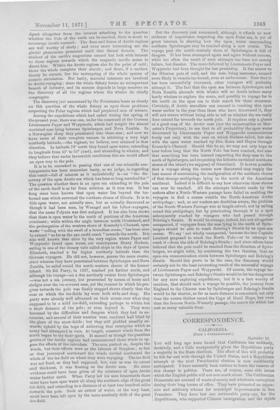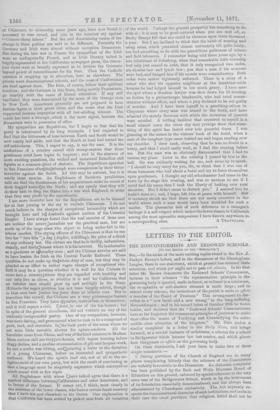CORRESPONDENCE.
CALIFORNIA.
(FROM A CORRESPONDENT.]
September 18. You will long ago have heard that California has suddenly, decisively, and a little unexpectedly given the Republican party a majority in the State elections. The effect of this will probably be felt far and wide through the United States, and a Republican triumph at the next Presidential election is now confidently anticipated. I have naturally been curious to learn the reasons of this change in politics. There are, of course, some side issues which the English public will not care much about. The Californian Democrats are accused of waste of money and wholesale corruption during their long tenure of office. They have promoted an expen- sive and arbitrary scheme for municipal improvements in San Francisco. They have lost one serviceable party-cry, for the Republicans, who supported Chinese immigration and the rights
of Chinamen to citizenship some years ago, have now found it necessary to veer round, and join in the common cry against "Chinese cheap labour." But the real determining causes of the change in State politics are said to be different. Formerly the Germans and Irish were almost without exception Democrats. But during the late war in France tho sympathies of the Irish were so undisguisedly French, and as Irish literary talent is largely represented in the Californian newspaper press, the obnox- ious views were so broadly expressed as to irritate the Germans beyond power of reconcilement for the time. Then the Catholic question is cropping up in education, here as elsewhere. The priests want denominational schools, and the mass of Californians are dead against them. The Irish, of course, follow their spiritual teachers ; and the Germans in this State, being mostly Protestants, go heartily with the cause of liberal education. If any still vacillated, they were determined by the news of the Orange riots in New York. Americans generally are not prepared to have faction-fights in their great cities, and the cause that the Irish supported became unpopular with all law-abiding citizens. The result has been a triumph ,which is the more signal, because the Democrats were in possession of office.
My sympathies are Republican, but I begin to fear that the party is intoxicated by its long triumphs. I had expected to find that the bitterness of tone between North and South would be now nearly laid aside, and that the North at least had buried the old unkindness. This, 1 regret to say, is not the case. It is the misfortune of a country cursed with stump-orators that those gentlemen must have topics to improve ; and in the absence of more exciting questions, the wicked and unnatural Rebellion still figures as a common-place of rhetoric. The Republican speeches in San Francisco afteritheltriumph were conspicuous by their bitter invective against the South. All this may be natural, but it is surely moat unwise. An Englishmen of Southern proclivities tells me that the Southerners of his acquaiutance make no secret of their dogged hatred:to the North ; and say openly that they will do their best to drag the States into a war with England, in order that they may profit by the opportunity.
I am more doubtful how far the Republicans are to be blamed for at last joining in the cry to exclude Chinamen. I do not much believe in the charges of exceptional immorality which are brought here and inj Australia against natives of the Celestial Empire. I have always found that the real enemies of these men are neither the severe,:moralists nor the practical men, but are made up of the large class who object to being under-bid in the labour market. The crying offence of the Chinaman is that he can live for " two bits ",:a day (Anglice, the price of a drink at any ordinary bar. His virtues are that he is thrifty, industrious, cleanly, and fairly:honest where it is his interest. He is admirable as a gardener or aIllaundry-man ; and the Chinese navvies are said to have beaten the Irish on the Central Pacific Railroad. These qualities do not make up the whole duty of man, but they may be pleaded as an offset to rather vague charges of exceptional vice. Still it may be a question whether it is well for the Chinese to come into a countrylwhere they are regarded with hostility and can only live as aliens, or whether it is well for California that an inferior race should grow up and multiply in the State. Hitherto the negro problem has not been happily solved, though in that case bare justice has ',been done at infinite cost. But to travellers like myself, the Chinese are a very picturesque feature in San Francisco. They have a/quarter, more orless, to themselves ; and it well repays a visit. I:went.to one of the tea-houses ; but in spite of the general cleanliness, did not venture on any of the curiously-compounded pastry. One of my companions, however, was more daring, and pronounced what he took to be a compound of pork, lard, and chocolate. In;the back parts of the room where we sat were little movable alcoves for opium-smokers. All the furniture came from China, and was of the kind common iu Madras. More curious still are the2jos.s-houses, with tapers burning before dingy deities, and a profuse ornamentation of gilt and lacquer-work. In one a scribe was sitting, and:painting a letter to the dictation of a young Chinaman, before an interested and sympathetic audience. We heard the epistle read out, not at all to the en- lightenment of our own party, but with the result of convincing us that a language must be singularly expressive which conveyed so much sound with so few signs.
All Englishmen with whom I.'have talked agree that there is a marked difference betweeniCalifornians and other Americans, and in favour of the former. It comes out, I think, most clearly in the manners of the lower classes, who have a certain frank courtesy that I have not met elsewhere in the States. One explanation is that California has been settled by picked men from all countries of the world. Perhaps the general prosperity has something to do. with it ; it is easy to be good-natured when you are well off, as Becky Sharpe felt that she could be virtuous upon three thousand a year. But I am inclined to think that the habit of wearing an using arms, which prevailed almost universally till quite lately,. has had something to do with the punctilious politeness of miners and field labourers. I remember being told three years ago, by a late inhabitant of Julesburg, when that remarkable little township. had only just ceased to exist, that it only recognized two codes, six-shooter-law and lynch law ; you shot a man if his manners• were bad, and hanged him if his morals were unsatisfactory. Both codes were rather vigorously enforced. There is a story of a miner who shot his opposite neighbour at the breakfast-table because be had helped himself to too much gravy. I have seen. the spot where a drunken lawyer was shot down for ill treating an Indian by a philanthropic blacksmith, who had tried remon- strances without effect, and whom a jury declared to be not guilty of murder. And I have been myself in a gambling-saloon in Cheyenne where every man was armed to the teeth, and have admired the stately decorum with which the occasions of quarrel were avoided. A trifling incident that occurred to myself in a small miners' town the other day may perhaps show that some- thing of this spirit has lasted over into peaceful times. I was glancing at the names in the visitors' book of the hotel, when a man of the roughest type came behind me and began reading over my shoulder. I drew back, observing that he was no doubt in a hurry, and that I could easily wait, as I had the evening before me. But the man was so obviously disconcerted that I had to resume my place. Later in the evening I passed by him in the hall. lb was evidently waiting for me, and came up to speak. "I should be very sorry for you, Sir, to think that I was one of those bummers who loaf about a hotel and try to force themselves upon gentlemen. I thought my old schoolmaster had come to the town by the stage this evening, and was so anxious to see if I could find his name that I took the liberty of looking over your shoulder. But I didn't mean to disturb you." I assured him he hadn't done so ; and, I hope, left him at peace with himself. But it certainly struck me that there are not many countries in the world where such a man would have been troubled for such a matter. The pleasanter side of such deference to a stranger's feelings is a self-respect, which makes the lower classes in California. among the most agreeable companions I have known anywhere it



































 Previous page
Previous page